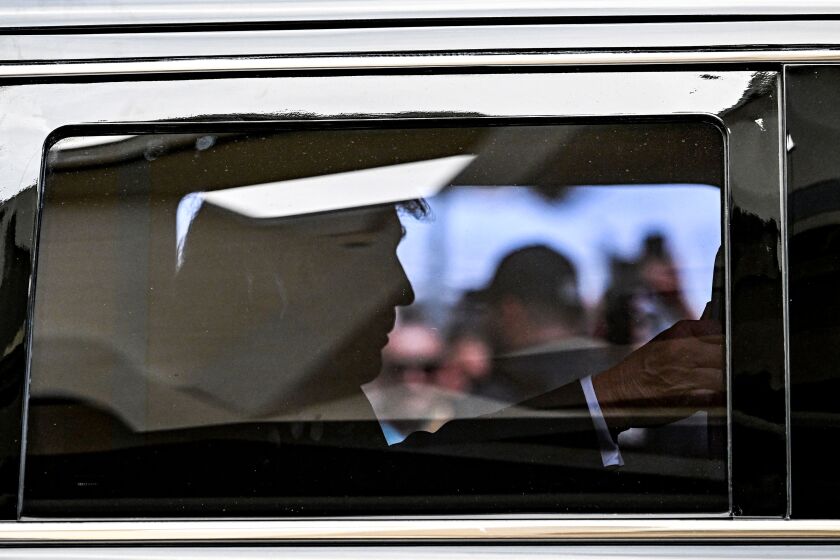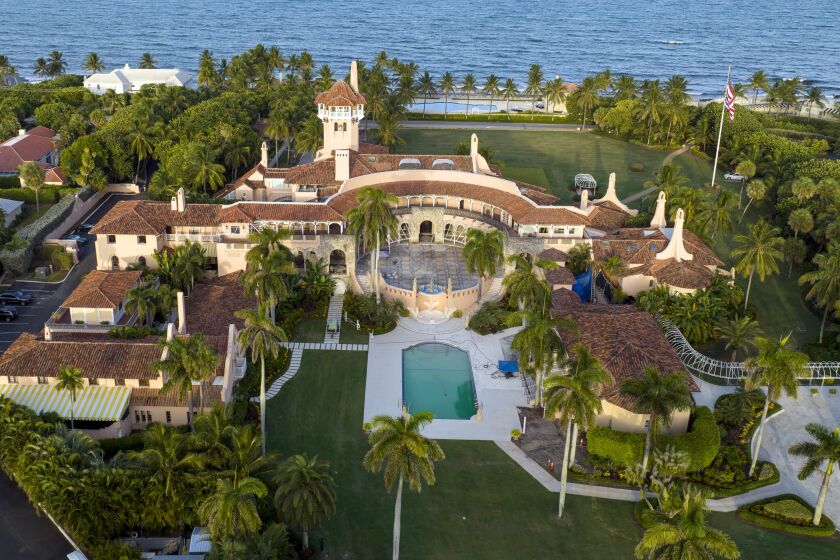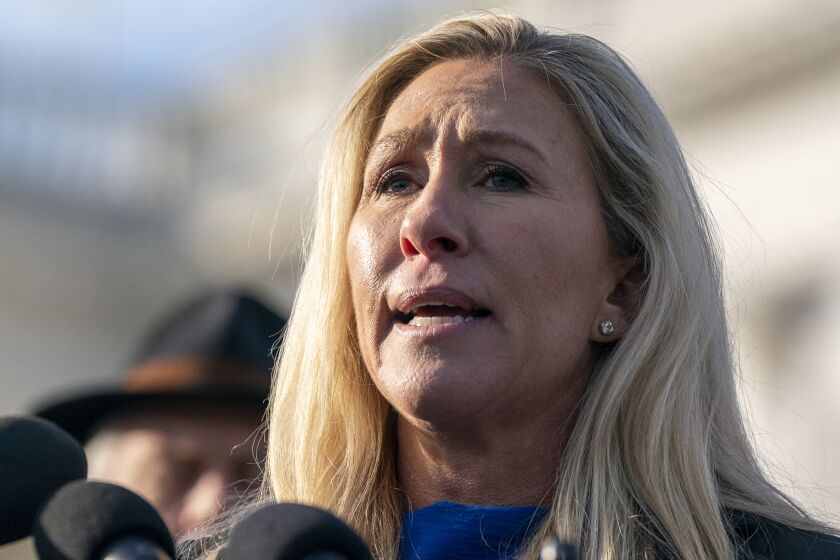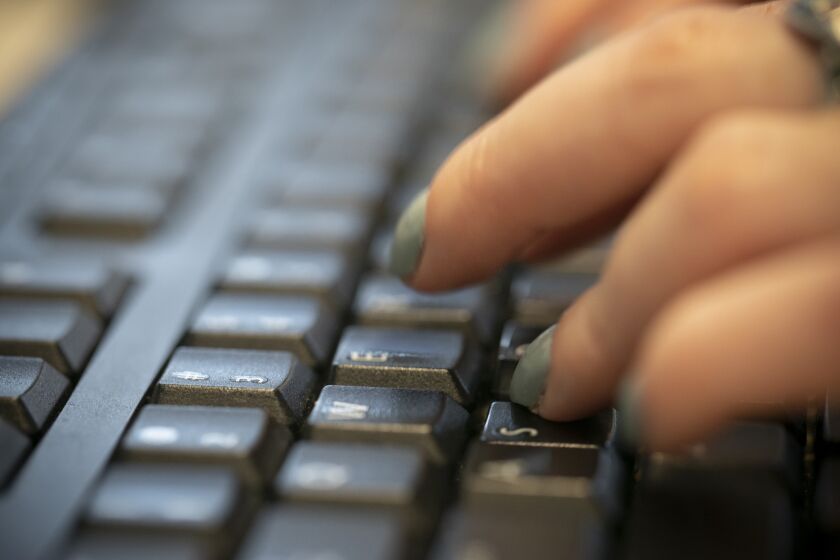What do Trump’s indictments mean? Answers to questions about the former president’s legal troubles
The federal judge assigned to the election fraud case against former President Trump stands out as one of the toughest punishers of rioters who stormed the U.S. Capitol. Judge Tanya Chutkan often has handed down prison sentences in Jan. 6, 2021, riot cases that are harsher than what Justice Department prosecutors recommended.
Hush-money payments allegedly disguised as legal fees. Sensitive federal documents stashed at Mar-a-Lago. And now, an alleged conspiracy to overturn the results of the 2020 presidential election.
A federal grand jury brought a third indictment against former President Trump on Tuesday, accusing him of committing four federal crimes in his efforts to prevent Joe Biden from being inaugurated as president. Three of those counts allege conspiracies against the United States and voters; the fourth accuses him of trying to obstruct Congress’ certification of the electoral college vote on Jan. 6 and 7, 2021.
It’s another distinction for the first former president ever to face federal criminal charges, and the first sitting president to be impeached twice (and acquitted twice by the Senate).
His legal troubles began in March, when a grand jury in Manhattan accused him of violating a state law against falsifying business records in connection with hush-money payments to a porn star. That case is still pending, and Trump has pleaded not guilty.
On June 8, a federal grand jury in south Florida indicted Trump on 37 felony charges related to his handling of classified documents after he left the White House. He pleaded not guilty to all charges. Then on July 27, three more charges related to the sensitive documents were added in a superseding indictment.
The documents charges resulted from a probe led by Jack Smith, a special counsel appointed by U.S. Atty. Gen. Merrick Garland. The new indictment Tuesday stemmed from a second investigation led by Smith, this one into allegations that Trump tried to interfere in the 2020 election.
One more election-related indictment may still be in the offing: grand juries in Fulton County, Ga., have been examining the pressure Trump placed on election officials there to turn his narrow defeat in that state into a victory.
Here’s a rundown of what’s happening, starting with the most recent developments and continuing back to the first indictment, as well as a summary of other looming problems for the former president.
Trump pleaded not guilty to 37 felony charges in connection with his handling of classified documents and alleged attempts to prevent the government from recovering them.
What are the latest charges against Trump?
The 45-page indictment alleges that Trump worked with at least six unnamed co-conspirators — five lawyers and a political consultant — to try to retain the presidency after his loss to Biden. The accusations will be familiar to anyone who followed the hearings held by the House Jan. 6 select committee, which urged the Justice Department to bring charges against the former president.
The indictment accuses the conspirators of knowingly spreading false and “crazy” assertions about election fraud; urging officials in seven states to reverse election results under false pretenses; creating slates of fake electors to obstruct Congress’ certification of the electoral college vote; and trying to persuade Vice President Mike Pence to ratify the fraudulent elector scheme.
Each count carries a potential prison term if Trump is convicted, ranging from a maximum of five years to a maximum of 20 years.
Trump denounced the charges on his social network, Truth Social, saying the Biden administration was the one engaged in election interference. He also said he “did nothing wrong [and] was advised by many lawyers.”
The indictment alleges that Trump pursued discounting legitimate votes and subverting the 2020 presidential election results through three criminal conspiracies.
What happens next?
Trump is scheduled to appear before a federal magistrate judge in Washington on Thursday, NBC News reported. That’s where he will formally enter a plea; he is expected to be released without having to post bail.
After that, the case will enter the phase where prosecutors share evidence with defense lawyers. Federal courts typically hold criminal trials more expeditiously than state courts, but Trump’s lawyers have argued in his other cases that his trials should be postponed until after the November 2024 election.
The U.S. District Court judge tabbed to preside over the latest Trump case, Tanya S. Chutkan, is an appointee of President Obama who has heard some of the cases brought against Trump supporters involved in the Jan. 6 attack on the U.S. Capitol. According to NBC News, she is “the only federal judge in Washington, D.C., who has sentenced Jan. 6 defendants to sentences longer than the government had requested.”
What about the other case Smith is pursuing?
The charges brought against the former president in June revolve around his failure to return government records he kept at Mar-a-Lago after leaving the White House in January 2021. According to the original indictment, these include top-secret and other classified records that discussed nuclear capabilities, potential U.S. vulnerabilities to attack and possible retaliatory strikes in response to such an attack.
Because of the sensitive military nature of some of the documents, a federal grand jury charged Trump with 31 violations of the federal Espionage Act, accusing him of unlawfully retaining information related to the national defense. The information doesn’t have to be classified; instead, according to court rulings, it simply needs to be material that the government has held closely because its disclosure might injure the United States.
The other half-dozen charges accuse Trump of trying to cover up his possession of the documents.
The superseding indictment handed down in July brought three more counts against Trump: one additional charge of willfully retaining national defense information, and two new charges of obstruction of justice.
The first relates to a meeting in July 2021 at Trump’s golf club in Bedminster, N.J., involving Trump, two aides and two people helping Trump’s former chief of staff, Mark Meadows, write his memoirs. At the meeting, Trump allegedly showed off a top-secret document discussing plans for an attack on a foreign country.
The two obstruction charges — which were also brought against Trump’s personal aide and co-defendant, Walt Nauta, along with a new defendant, Mar-a-Lago employee Carlos de Oliveira — accuse the men of trying to erase surveillance video from Mar-a-Lago that Smith’s investigators were seeking. The investigators were looking for evidence that Trump had tried to hide some of the government documents sought by the National Archives and Records Administration.
Former President Trump is facing additional charges on new allegations in the Justice Department’s prosecution over classified documents in Florida.
Why was Trump charged when others weren’t?
After the FBI recovered documents from Trump, President Biden and Pence also disclosed that they had found classified papers in their possession. What distinguishes Trump’s case from theirs, legal observers say, is that Biden and Pence have worked with federal officials to return documents, while Trump is accused of obstructing the government’s efforts to retrieve them.
The Justice Department issued a statement this month saying it wouldn’t charge Pence. The special prosecutor’s investigation into the Biden documents is ongoing.
The FBI investigated former Secretary of State Hillary Clinton in 2015 and 2016 for using a private email server at her home, which the agency found had handled 110 pieces of information that should have been restricted to the department’s classified email system. Then-FBI Director James B. Comey criticized Clinton for “careless” handling of classified material but said there was no evidence that she’d intended to violate the law.
Critics of the investigation say that Clinton’s staff shouldn’t have been allowed to destroy some 30,000 emails before they were reviewed by the FBI. Clinton’s team said at the time that the emails were personal, not related to State Department business.
The Justice Department has prosecuted and continues to prosecute lower-level government employees for document crimes under the Espionage Act. Under the Trump administration, for example, five current or former government employees were charged under the act for allegedly leaking national defense information to the press.
Is the Biden administration prosecuting the president’s top political opponent?
Polls show that, by a wide margin, Trump is the leading Republican candidate to face Biden in 2024. But while the administration is ultimately responsible for the Justice Department, it wasn’t involved in the decision to bring charges against the former president.
The investigations and prosecutions are the work of a special counsel, so there’s a measure of independence from the White House. Although Smith was picked by Garland, a Biden appointee, federal regulations prevented the attorney general from influencing Smith’s decision to prosecute.
The former president pleaded not guilty to federal charges in Florida. It’s the latest episode of a half-century of legal trouble and journalistic malfeasance.
Doesn’t the Presidential Records Act absolve Trump?
The former president claims that the federal Presidential Records Act gives him the authority to take papers back to Mar-a-Lago. “There was no crime, except for what the DOJ and FBI have been doing against me for years,” Trump wrote on Truth Social.
The National Archives and Records Administration, which is the official custodian of White House records, responded that the act does no such thing.
“The Presidential Records Act (PRA) requires the President to separate personal documents from Presidential records before leaving office,” NARA said in a statement June 9. “The PRA makes clear that, upon the conclusion of the President’s term in office, NARA assumes responsibility for the custody, control, preservation of, and access to the records of a President.... There is no history, practice, or provision in law for presidents to take official records with them when they leave office to sort through, such as for a two-year period as described in some reports.”
What happens next in the records case?
U.S. District Judge Aileen Cannon has set a trial date for May 20, 2024 — after all but a handful of states have held their presidential primaries. The trial will be held in federal court in Fort Pierce, Fla., where Cannon is based.
Prosecutors wanted to start the trial in December, but Trump’s lawyers sought to delay it until after the election, raising the possibility of a victorious Trump pardoning himself or ordering the charges to be dismissed. Cannon split the difference, considering the legal requirement for a speedy trial and the time Trump’s team needs to review the vast collection of documents involved in the case.
The case is currently in the phase where prosecutors disclose the evidence they’ve gathered to Trump’s lawyers, and the two sides can begin making procedural motions, such as a motion to dismiss the case.
The Florida jurist could impede the Department of Justice’s effort to hold the former president accountable for his handling of classified records in a few ways.
Why did New York City prosecutors investigate Trump?
Because Trump was accused of violating state law while in New York in 2016, when he was running for president.
One of Trump’s former attorneys, Michael Cohen, admitted in federal court that he paid $130,000 to porn actor Stormy Daniels shortly before the 2016 election to keep her from talking about an affair she says she had with Trump. Cohen also admitted in court papers that Trump’s New York City-based real estate business reimbursed him the next year but disguised the payments as a large monthly retainer.
Trump has denied having an affair with Daniels and paying her to stay quiet. One of his current lawyers has accused her of extorting money from him. The former president declined an invitation to testify before the Manhattan grand jury.
What are the charges there?
Trump is accused of 34 separate violations of a New York law against falsifying business records to conceal another crime, a felony punishable by up to four years in state prison and a $5,000 fine. The charges relate to 11 checks written to Cohen in 2017, along with the invoices and account entries associated with them.
In a statement of facts about the case, Manhattan Dist. Atty. Alvin Bragg Jr. alleged that the payments were part of a scheme led by Trump “that hid damaging information from the voting public during the 2016 presidential election.” As part of that scheme, the statement alleges, Trump and “Lawyer A” — i.e., Cohen — made payments either to buy the silence of or bury accusations made by a former Trump Tower doorman in 2015 and two unnamed women. The conspiracy also involved the editor in chief of the National Enquirer, who agreed to pay $30,000 to the doorman and $150,000 to one of the women not to discuss their accusations that Trump had engaged in extramarital affairs, the statement alleges.
That woman appears to be Karen McDougal, a former Playboy Playmate of the Year who sued the parent company of the National Enquirer in 2018 to be released from the contract that barred her from discussing the affair she says she had with Trump. As with Daniels, Trump denies having an affair with McDougal.
The charges in the indictment relate only to the payment Cohen has admitted making to the second woman, Daniels. The statement alleges that the Trump Organization paid Cohen back through monthly checks in 2017 that it characterized as a legal retainer, even though “there was no such retainer agreement” and Cohen rendered no services that year. Trump signed nine of the checks himself, the statement alleges; the other two were signed by one of Trump’s sons and the Trump Organization’s chief financial officer.
New York requires defendants to appear in person to be booked, which is why Trump flew to the city Monday for the arraignment Tuesday. Accompanied by Secret Service agents, he turned himself in at a Manhattan courthouse early Tuesday afternoon and reportedly was booked, but no mugshot was taken.
What happens next in that case?
Trump is free on bail, with his trial scheduled to begin March 24. Defense motions will be due by the end of August. Rulings on those motions aren’t due until early in 2024.
Is there a statute of limitations on Trump’s alleged N.Y. crimes?
There is, but the time limit was extended because of the COVID-19 pandemic. Also, the clock stops when the defendant spends an extended amount of time away from New York; some legal analysts say that this would apply to Trump because of the four years he spent in the White House.
Does this have anything to do with the 2020 election?
No. These accusations relate to the 2016 election, which Trump won.
It’s foolish to predict the impact if Trump is indicted. But there’s reason to believe things have changed and his scot-free days may be over.
Isn’t Cohen a convicted liar?
Yes. In 2018, he pleaded guilty to lying to a bank about his debts in order to obtain a $500,000 home equity line of credit. He also pleaded guilty to five counts of tax evasion and, in connection to the hush money payments, two campaign finance law violations.
What about New York state prosecutors?
The state attorney general, Letitia James, in September filed suit against Trump and several of his family members and businesses, as well as Weisselberg, accusing them of fraudulently inflating Trump’s net worth on official financial filings. The point of the scheme, the lawsuit alleges, was to help Trump obtain loans and insurance policies on better terms.
This a civil case seeking financial penalties, not a criminal case seeking jail terms. But James referred the matter to the IRS and the Justice Department for possible criminal charges, alleging that Trump violated federal laws against fraud and making false statements to financial institutions.
In an interview with The Times, former House Speaker Nancy Pelosi says she’s ‘liberated,’ ‘free at last’ and writing a book.
Who else is pursuing charges against Trump?
One case that has made headlines is the investigation by a Fulton County, Ga., grand jury into an alleged attempt to interfere with the 2020 presidential election. This case revolves around post-election efforts by Trump and his supporters to reverse the outcome in Georgia, where Biden narrowly won. Fulton County Dist. Atty. Fani Willis has not yet acted on the recommendations from the grand jury, which called for multiple indictments.
Trump has denied any wrongdoing in this case as well.
The race for former President Trump’s favor to be his running mate for vice president is heating up, with the first Republican presidential primaries nearly a year away.
Would being arrested affect Trump’s ability to serve as president?
No. Even if he were convicted and sent to prison, Trump could serve as president — the U.S. Constitution requires only that a president be at least 35 years old, a “natural born citizen” and a resident of the U.S. for at least 14 years.
Any criminal charges against Trump would certainly affect his campaign. And if he were imprisoned, winning the 2024 election wouldn’t automatically cut short his sentence.
It’s unclear how he would be able to discharge the duties of his office from a prison cell, which means the 25th Amendment could come into play. Under that, a president can hand off his duties temporarily to the vice president if he cannot perform them himself, or the duties can be taken from him if the vice president and a majority of top executive branch officials vote to do so.
Once in office, Trump could not be removed unless the House impeached him (for a third time) and the Senate convicted him (for the first time).
By the way, the Constitution doesn’t say whether the “high crimes and misdemeanors” required for impeachment can occur before a president takes office. In fact, it leaves it to Congress to decide what acts constitute impeachable offenses and when they must have occurred.
About The Times Utility Journalism Team
This article is from The Times’ Utility Journalism Team. Our mission is to be essential to the lives of Southern Californians by publishing information that solves problems, answers questions and helps with decision making. We serve audiences in and around Los Angeles — including current Times subscribers and diverse communities that haven’t historically had their needs met by our coverage.
How can we be useful to you and your community? Email utility (at) latimes.com or one of our journalists: Jon Healey, Ada Tseng, Jessica Roy and Karen Garcia.
Get our Essential Politics newsletter
The latest news, analysis and insights from our politics team.
You may occasionally receive promotional content from the Los Angeles Times.

















